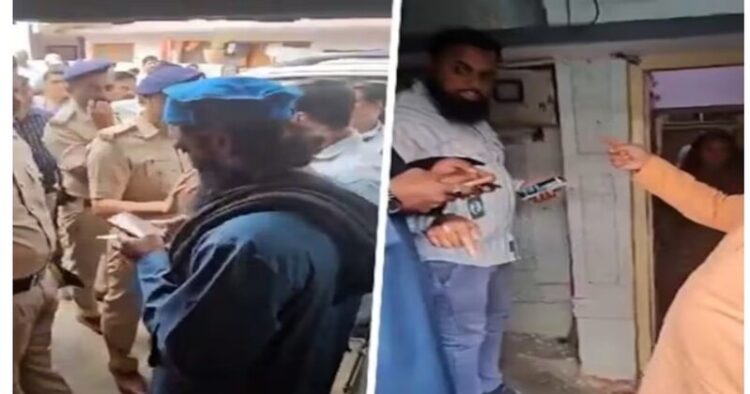In a dramatic operation, the National Commission for Protection of Child Rights (NCPCR) led by its Chairperson, Priyank Kanoongo, alongside local law enforcement authorities, rescued young girls who were allegedly being trafficked to Arab countries from an illegal orphanage in Bengaluru, Karnataka.
Acting on a tip-off, a team of officials conducted a raid on the orphanage premises, uncovering shocking evidence of human trafficking. The operation, which took place on Friday, March 15, unfolded swiftly as authorities moved to rescue the vulnerable girls from the clutches of exploitation.
Priyank Kanoongo shared details of the operation in a statement, expressing profound concern over the illicit activities taking place within the walls of the orphanage. “Shocking facts have come to light during the inspection of an illegal orphanage in Bangalore, Karnataka,” stated Kanoongo.
आज कर्नाटक के बंगलुरु में एक अवैध यतीमख़ाने का निरीक्षण करने के दौरान चौकाने वाली जानकारी सामने आयी है।
– यहाँ 20 लड़कियाँ थीं जिनमें से अनाथ बच्चियाँ भी हैं।
– बच्चियों को स्कूल नहीं भेजा जाता है,पूरे बाल गृह में भी खिड़की या रोशनदान नहीं है,लड़कियों को एकदम क़ैद कर के रखा गया… pic.twitter.com/fPKLhW4W57— प्रियंक कानूनगो Priyank Kanoongo (मोदी का परिवार) (@KanoongoPriyank) March 15, 2024
Shockingly, the girls were found to be living in dire conditions, deprived of basic amenities and education. It was discovered that the facility lacked proper ventilation, with no windows or skylights, effectively keeping the girls confined in a prison-like environment. Furthermore, despite some of the girls having previously attended school, their education had been abruptly discontinued upon their arrival at the orphanage.
During conversations with the rescued girls, disturbing details emerged regarding the alleged involvement of a woman named Salma, responsible for overseeing the orphanage, in arranging relationships for the girls in Kuwait. Initial investigations suggest that the orphanage may have been involved in grooming girls for trafficking under the guise of marriage, a practice previously reported in South India.
However, the situation escalated during the investigation when attempts were made to present the girls before the Child Welfare Committee (CWC). Salma and her associate, Shameer, allegedly called upon goons who instigated a confrontation.
NCPCR Chairperson Priyank Kanoongo disclosed that the orphanage housed 20 girls, some of whom were orphans, in deplorable conditions. The girls were reportedly denied access to education, with no windows or skylights in the facility, effectively keeping them imprisoned. Disturbingly, some girls had their education abruptly discontinued upon arrival at the orphanage.
During investigations, it was revealed that a woman named Salma, in charge of the orphanage, allegedly arranged relationships for the girls in Kuwait. Preliminary discussions suggested that the orphanage was involved in grooming girls for trafficking under the guise of marriage, a practice previously reported in South India.
However, tensions escalated during attempts to present the rescued girls before the Child Welfare Committee (CWC). Salma and her associate, Shameer, reportedly called upon goons to disrupt the proceedings. Despite police intervention, the situation remained volatile, prompting the NCPCR team to seek refuge at the Sampigahalli police station in Bangalore North-East.
Kanoongo expressed concerns about the safety of NCPCR officials, revealing that goons were waiting outside the police station, threatening dire consequences. Shockingly, the Karnataka police allegedly refused to file a First Information Report (FIR), raising questions about the government’s response to criminal activities.
The rescue operation resulted in the NCPCR rescuing the 20 girls from the orphanage, with a case registered at the Sampigehalli police station based on the NCPCR complaint. However, critics have condemned the Karnataka government’s perceived leniency towards criminals, particularly under a Congress-led administration accused of Muslim appeasement.
Critics allege that the incident underscores a broader issue of lawlessness and lack of accountability in Karnataka, particularly concerning illegal activities facilitated by influential individuals. Despite the prompt registration of FIRs in other cases, authorities have seemingly turned a blind eye to the alleged perpetrators behind the illegal orphanage and human trafficking trade.
Moreover, concerns have been raised about the fate of the rescued girls, with allegations suggesting they may be subjected to further exploitation, including sex alteration or removal of sexual organs, before being sold as slaves in Arab countries.
The incident serves as a stark reminder of the urgent need for stringent measures to combat human trafficking and protect the rights of vulnerable individuals. As investigations continue, authorities face mounting pressure to hold those responsible accountable and ensure justice for the victims of this heinous crime.




















Comments